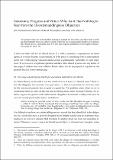Autonomy, progress and virtue : why Kant has nothing to fear from the overdemandingness objection
Abstract
Is Kant’s ethical theory too demanding? Do its commands ask too much of us, either by calling for self-sacrifice on particular occasions, or by pervading our lives to the extent that there is no room for permissible action? In this article, I argue that Kant’s ethics is very demanding, but not excessively so. The notion of ‘latitude’ (the idea that wide duty admits of ‘exceptions’) does not help. But we need to bear in mind (i) that moral laws are self-imposed and cannot be externally enforced; (ii) that ‘right action’ is not a category of Kantian ethics – there is a more and a less, and lack of perfection does not entail vice; and (iii) that only practice makes perfect, i.e. how much virtue can realistically be expected can vary from agent to agent. The principle that ‘ought’ is limited by ‘can’ is firmly entrenched in Kant’s ethical thought.
Citation
Timmermann , J 2018 , ' Autonomy, progress and virtue : why Kant has nothing to fear from the overdemandingness objection ' , Kantian Review , vol. 23 , no. 3 , pp. 379-397 . https://doi.org/10.1017/S1369415418000201
Publication
Kantian Review
Status
Peer reviewed
ISSN
1369-4154Type
Journal article
Collections
Items in the St Andrews Research Repository are protected by copyright, with all rights reserved, unless otherwise indicated.

